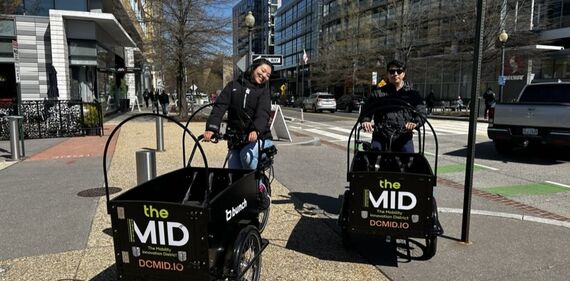
Piloting Place-based Micromobility as a Service
GGCI recently partnered with the DC Mobility Innovation District to explore the potential of place-based business models for the greater adoption of e-bikes. The project was advanced by students in the McDonough School of Business and the Urban & Regional Planning Program and was overseen by Prof. Robin Dillon-Merrill and Prof. Uwe Brandes.
"Having the amazing opportunity to work with the Mobility Innovation District was a collaborative and educative experience which provided me with immense insight on the remarkable projects that are being done across the country within the micro-mobility space." commented Carys Winter, student at the McDonough School of Business.
"The DCMID is on the forefront of really exciting work in the micro-mobility and shared resource spaces. I believe this initiative has the potential to make a real difference in SW residents' lives. It was a pleasure to be a part of this project, and speak directly with users about their experiences." commented Jess Eliot Myhre, masters student in urban planning.
"The SWBID is rethinking the future of micromobility in the D.C. region with innovative and creative strategies, and being part of the work on quantifying the effects of new ideas as well as aiding in the process of moving to the next stage has been incredibly rewarding this summer. Hearing users speak about the difference that micromobility is making in their lives already was especially interesting, and I feel confident in the future of shared mobility in D.C. knowing that the future is bright for this type of amazing and necessary work." stated Gavin Meyer, masters student in urban planning.
The project evaluated a ten-month old pilot project administered by the Southwest Business Improvement District’s (“SWBID”) Mobility Innovation District (“MID”), a multi-year initiative funded by DC’s Office of Deputy Mayor for Planning and Economic Development (DMPED). The demonstration project creates a place-based, e-bike and cargo e-bike lending library for Washington, DC’s Southwest residents and workers as a community-based, micro-mobility resource. This report studies the impact and feasibility of the MID’s e-bike library pilot using primary and secondary research.
The SWBID’s e-bike and cargo e-bike program (“the Project”) gave neighborhood residents an opportunity to rent e-bikes for a longer lending period at no cost to meet their mobility needs. The majority of the e-bike borrowers used their bikes for commuting purposes, and most of these trips were short and local in nature. Many users were also experienced bicycle enthusiasts who were looking for an alternative mobility service to fulfill their daily needs within and outside the boundaries of the SWBID.
Based on findings from bike user data, as well as interviewees with e-bike borrowers, e-bike giveaways, and cargo bike participants, our research indicates that Southwest DC program participants engaged in the pilot program with a general enthusiasm and demonstrated a positive reception. There is a strong desire from participants for this program to continue. Program participants used their e-bikes for a variety of purposes, indicating that this service fulfilled a niche transportation need for Southwest DC community members.
In other words, the first iteration of this program yielded high promise and high usage rates. A place-based, e-bike lending library will continue to meet important needs for residents and workers alike if it was scaled-up with a greater number of vehicles. Similar e-bike sharing programs across the country and in other communities within Washington DC fill a niche mobility demand that results in positive reception and usage rates, and our research demonstrates the MID e-bike library also achieved similar results.
This evaluation provides recommendations for potential improvement and growth. Given the fact that this demonstration project has produced limited and seasonal data, we recommend an extension and expansion of the demonstration project in order to better assess the long-term impacts and produce definitive research findings.

